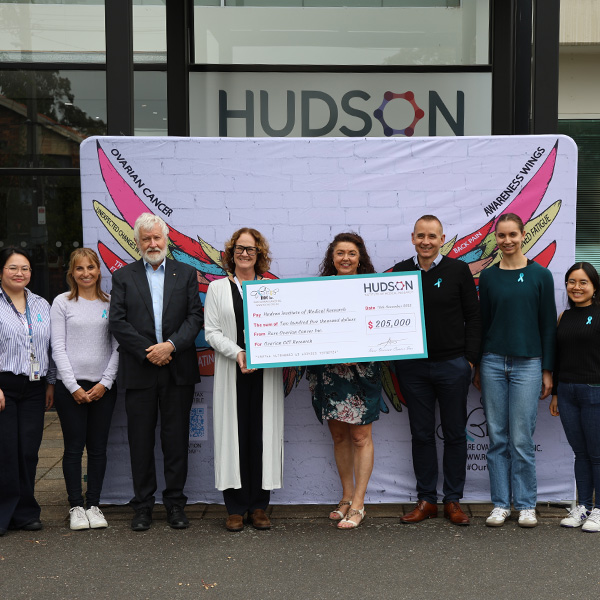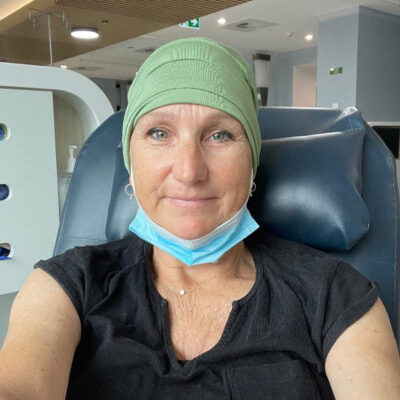Social solution – rare ovarian cancer insights
By Rob Clancy, staff writer. Reviewed by Associate Professor Simon Chu
Cancer specialists have taken a novel path to advance their research – tapping into a Facebook group for rare ovarian cancer insights.

Patients often don’t feel heard by the medical profession, so this world-first study published in the journal Cancer listened to women living with rare ovarian cancers via the social media group they set up themselves.
743 members of the GCT-Survivor Sisters (GCT-SS) Facebook® group chose to share their experiences of being treated for Granulosa Cell Tumours, putting the researchers in a privileged position and giving the women a chance to make a difference.
US-based group member Sue Rodgers said they had been trying for many years to bring attention to this rare disease when researcher Maria Alexiadis at Hudson Institute reached out and a wonderful relationship was formed.
“Social media has played an extremely important part in sharing effective cancer treatments for GCT, research findings and educating people to advocate for themselves with their physicians who may have little knowledge of the disease, Ms Rodgers said.
What is GCT?
- Granulosa Cell Tumours (GCT) are rare, making up two-seven per cent of malignant ovarian cancers. They can develop at any age, even in children. The condition has a high rate of late recurrence, meaning even if surgery is effective, women live for years in constant fear that their cancer might return.
- Associate Professor Simon Chu’s Hormone Cancer Therapeutics research group is striving to bring hope to children and women with granulosa cell tumours – through better diagnosis, early detection and more targeted treatment.
Tapping into women’s cancer experience
A/Prof Chu said it was a rare opportunity to tap into these women’s experiences of their treatment and follow-up.
“One of the exciting parts is that we’re delving into an area that’s new,” Dr Chu said. “Effectively what this group has done is build a medical database with some amazing information. What’s even more special is that they chose to share that database with us, so we could help design better treatments.”
Ms Alexiadis was part of a team including researchers from Monash and Deakin Universities; for all of them it was a new approach and a very worthwhile one.
“Because of its rarity, there’s a lack of clinical evidence to point to the most effective treatments; there’s even a lot of uncertainty about chemotherapy, and limited evidence regarding its benefit for both early and advanced stage of this disease,” Ms Alexiadis said.
“So, naturally forming consumer groups on social media may assist with developing the evidence base for care and supporting those living with rare diseases such as GCT.
Professor Victoria White from Deakin University and lead author on the paper reporting the results of the GCT-SS data agrees. “There is growing interest and expectation that people with lived experience will be involved in research investigating their condition – this study demonstrates the benefits of this approach. Being able to access the database that the GCT-SS had developed through their group and then working with members of the group to report on the findings from their data has been a terrific experience and helps to ensure the issues consumers want to see addressed are recognised.”
Shellharbour-based Tasha Armour, CEO of Rare Ovarian Cancer (ROC) Inc, said having a child diagnosed with a rare ovarian cancer that had previously received no research is a pain hard to put into words.
“This research brings so much hope for future treatment options. I was thrilled to join my fellow Survivor Sisters members as co-authors of this study. It’s been amazing to work with the team to get closer to a treatment for these rare cancers, especially Juvenile Granulosa Cell Tumours, which are among the rarest ovarian cancers. It’s very significant research that we can all be proud of.” she said.
Survivor Sisters – in their own words

I founded GCT Survivor Sisters in 2012 with four members and a goal to connect to others who had this rare cancer. We have now grown to over 1,800 worldwide and our members have become “experts” through their own experiences, supporting each other through a cancer that very few understand. Very early on, we realized we had a unique opportunity to gather information about our experiences in an effort to find patterns commonalities in our diagnoses, treatments and outcomes. We began actively gathering this data as part of our intake process and discussing it with our physicians and researchers in various countries. We are thrilled that Hudson Institute has seen value in our data and has provided the opportunity to present it to the cancer research community. We are making a difference in the lives of women with GCT, and this research is the pinnacle of our efforts to date. – Kim Eroh, North Carolina, USA

“For me, being diagnosed with a rare cancer was isolating and concerning – concerning mainly because GCT seemed to be excluded from many trials or drugs which were available to other ovarian cancer patients.
Having our data picked up by Hudson Institute alongside the focussed research plan felt as though at last, someone was rooting for us. Being part of this research has given me a credible voice.”- Linda Langdale, Surrey, UK

“It’s been a privilege and honor to be part of the research process with everyone at Hudson Institute. I am confident our data and tumor sample donations will contribute to the medical community.
My hope is the research reaches a diverse medical professional audience and fosters better doctor/patient communications and relationships regarding treatments for GCT and other rare ovarian cancers.” – Sue Rodgers, Silver Creek, NY, USA

“We GCT sisters sometimes feel that we’re struggling to get our doctors’ attention and that our disease is not taken as seriously as it should be. There are very few clinical trials which include treatments for GCT and hardly any that focus on GCT exclusively. For years we’ve tried to get a research team to use our data to advance knowledge and understanding of our disease and its treatment.
The Hudson team is the first team to indicate sincere interest and, from the beginning, it was obvious that they were sincere in their dedication to studying GCT.” – Kaye Ackermann, Charlotte, North Carolina, USA

“Having a child diagnosed with a rare ovarian cancer that had previously received no research is a pain hard to put into words. This research brings so much hope for future treatment options. I was thrilled to join her fellow Survivor Sisters members as co-authors of this study. It’s been amazing to work with the team to get closer to a treatment for these rare cancers, especially Juvenile Granulosa Cell Tumours, which are among the rarest ovarian cancers. It’s very significant research that we can all be proud of.” – Shellharbour-based Tasha Armour, Founder and CEO of Rare Ovarian Cancer (ROC) Inc
Listen to co-author Professor Vicki White discussing this study with Canberra radio station 2CC.
Journal | Cancer
Title | How social media can help to understand treatment experiences of survivors of rare cancers: Findings from the Granulosa Cell Tumor Survivor Sisters Facebook group member survey
View publication | https://acsjournals.onlinelibrary.wiley.com/doi/full/10.1002/cncr.34767
In this article
About Hudson Institute
Hudson Institute’ s research programs deliver in three areas of medical need – inflammation, cancer, women’s and newborn health. More
Hudson News
Get the inside view on discoveries and patient stories
“Thank you Hudson Institute researchers. Your work brings such hope to all women with ovarian cancer knowing that potentially women in the future won't have to go through what we have!”






